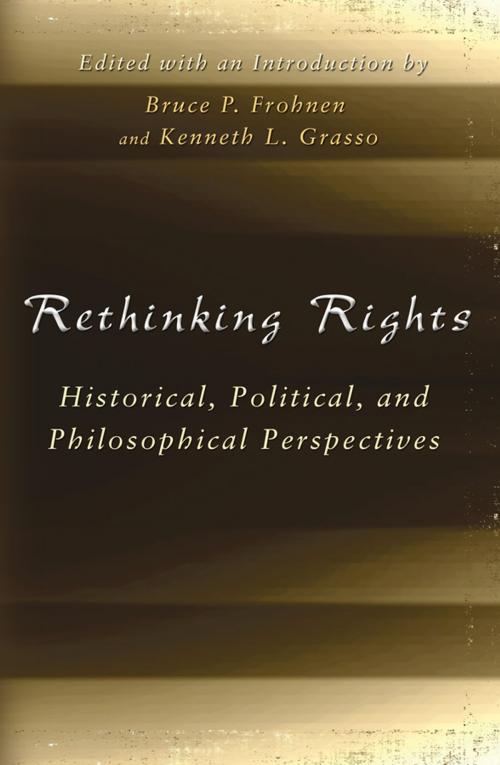Rethinking Rights
Historical, Political, and Philosophical Perspectives
Nonfiction, Religion & Spirituality, Philosophy, Political, Social & Cultural Studies, Political Science, Politics, History & Theory| Author: | ISBN: | 9780826266521 | |
| Publisher: | University of Missouri Press | Publication: | December 24, 2008 |
| Imprint: | University of Missouri | Language: | English |
| Author: | |
| ISBN: | 9780826266521 |
| Publisher: | University of Missouri Press |
| Publication: | December 24, 2008 |
| Imprint: | University of Missouri |
| Language: | English |
As reports of genocide, terrorism, and political violence fill today’s newscasts, more attention has been given to issues of human rights—but all too often the sound bites seem overly simplistic. Many Westerners presume that non-Western peoples yearn for democratic rights, while liberal values of toleration give way to xenophobia.
This book shows that the identification of rights with contemporary liberal democracy is inaccurate and questions the assumptions of many politicians and scholars that rights are self-evident in all circumstances and will overcome any conflicts of thought or interest. Rethinking Rights offers a radical reconsideration of the origins, nature, and role of rights in public life, interweaving perspectives of leading scholars in history, political science, philosophy, and law to emphasize rights as a natural outgrowth of a social understanding of human nature and dignity.
The authors argue that every person comes to consciousness in a historical and cultural milieu that must be taken into account in understanding human rights, and they describe the omnipresence of concrete, practical rights in their historical, political, and philosophical contexts. By rooting our understanding of rights in both history and the order of existence, they show that it is possible to understand rights as essential to our lives as social beings but also open to refinement within communities.
An initial group of essays retraces the origins and historical development of rights in the West, assessing the influence of such thinkers as Locke, Burke, and the authors of the Declaration of Independence to clarify the experience of rights within the Western tradition. A second group addresses the need to rethink our understanding of the nature of existence if we are to understand rights and their place in any decent life, examining the ontological basis of rights, the influence of custom on rights, the social nature of the human person, and the importance of institutional rights.
Steering a middle course between radical individualist and extreme egalitarian views, Rethinking Rights proposes a new philosophy of rights appropriate to today’s world, showing that rights need to be rethought in a manner that brings them back into accord with human nature and experience so that they may again truly serve the human good. By engaging both the history of rights in the West and the multicultural challenge of rights in an international context, Rethinking Rights offers a provocative and coherent new argument to advance the field of rights studies.
As reports of genocide, terrorism, and political violence fill today’s newscasts, more attention has been given to issues of human rights—but all too often the sound bites seem overly simplistic. Many Westerners presume that non-Western peoples yearn for democratic rights, while liberal values of toleration give way to xenophobia.
This book shows that the identification of rights with contemporary liberal democracy is inaccurate and questions the assumptions of many politicians and scholars that rights are self-evident in all circumstances and will overcome any conflicts of thought or interest. Rethinking Rights offers a radical reconsideration of the origins, nature, and role of rights in public life, interweaving perspectives of leading scholars in history, political science, philosophy, and law to emphasize rights as a natural outgrowth of a social understanding of human nature and dignity.
The authors argue that every person comes to consciousness in a historical and cultural milieu that must be taken into account in understanding human rights, and they describe the omnipresence of concrete, practical rights in their historical, political, and philosophical contexts. By rooting our understanding of rights in both history and the order of existence, they show that it is possible to understand rights as essential to our lives as social beings but also open to refinement within communities.
An initial group of essays retraces the origins and historical development of rights in the West, assessing the influence of such thinkers as Locke, Burke, and the authors of the Declaration of Independence to clarify the experience of rights within the Western tradition. A second group addresses the need to rethink our understanding of the nature of existence if we are to understand rights and their place in any decent life, examining the ontological basis of rights, the influence of custom on rights, the social nature of the human person, and the importance of institutional rights.
Steering a middle course between radical individualist and extreme egalitarian views, Rethinking Rights proposes a new philosophy of rights appropriate to today’s world, showing that rights need to be rethought in a manner that brings them back into accord with human nature and experience so that they may again truly serve the human good. By engaging both the history of rights in the West and the multicultural challenge of rights in an international context, Rethinking Rights offers a provocative and coherent new argument to advance the field of rights studies.















